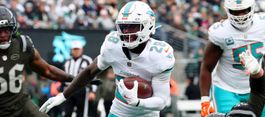David Montgomery, Iowa State
Height: 5’10”
Weight: 222 pounds
40-yard dash: 4.64 seconds
Vertical Jump: 38.5 inches
Broad Jump: 121 inches
3-Cone Drill: N/A
For those who were Montgomery supporters, they didn’t expect him to be a workout warrior at the Combine, as he’s not someone who’ll blow your doors off with speed. He’s more of the power-type running back who’s going to fight for his yardage and create with his combination of vision and effort.
Complete a mock draft in minutes with our free Draft Simulator ![]()
Looking at his unimpressive 4.7 yards per carry while at Iowa State, some would want to write him off, though the perceived No. 1 running back in the class (Josh Jacobs) averaged 5.3 yards per carry behind a much better offensive line. In the end, college production can sometimes be misleading depending on the situation. Montgomery did receive over 500 carries the last two years at Iowa State, so he has some tread on his tires.
Vision/Awareness: 3.5 out of 5 stars
There wasn’t much room to operate behind a subpar offensive line, so Montgomery had to be somewhat creative to gain yardage. When there was a hole, he’s going to hit it, but we also saw him manipulate defenders in a way that would allow him to break free if he won a one-on-one battle. He’s not someone who possesses truly elite vision from what we’ve seen, but he is fully aware of where his team is on the field. When it’s a short-yardage situation, he knows what lane to hit and how to hit it. He’s also extremely sharp in the red zone, as holes typically shrink with the shorter field, but it didn’t seem to affect his decision-making.
Elusiveness (twitch, juke, tackle-breaking): 5.0 out of 5 stars
The best word to describe him while running the ball: Relentless. He refuses to go down on first contact, similar to the way you see someone like Marshawn Lynch fight for extra yards. I’m fairly certain his goal is to have the whistle blown before he’s taken to the ground. He uses everything from spins, jukes, jumps, and lowering of the shoulder to create yardage. For a bigger guy, he’s extremely slippery and difficult to square- up for defenders. This is likely due to the low center of gravity he has while running the ball, similar to his NFL comp below.
Speed: 2.0 out of 5 stars
This is the category that will hurt Montgomery most, as he’s not going to break long runs very often. He’s not a burner and won’t out-run defenders to the edge but is rather a grinder and someone who’ll wear you down as the game goes on. He’s not terribly slow and can still outrun some linebackers, but speed isn’t a big part of his game.
Pass-catching/Pass Protection: 2.0 out of 5 stars
He’s not a three-down back who will catch 80-plus passes a season, which definitely limits his upside in today’s NFL where running backs are treated like wide receivers in some offenses. If there’s one area Montgomery can clearly improve, it’s improvising, as it seemed he was lost when his quarterback had to scramble. His route-running is opposite from his ball-carrying, as he runs his routes with minimal urgency. While it may have been the offense and him knowing he wouldn’t get the ball much, that won’t fly if he wants to be a workhorse in the NFL. He is a good pass-protector, as he uses his low center of gravity and strength to hold up defenders very well. Pass-catching is more of a priority in today’s NFL, so his grade comes in as slightly below average.
Balance: 4.5 out of 5 stars
Montgomery is the type of running back that head coaches love. He’s someone who always has hit pad-level low when going into contact and he’s always going to fall forward to gain that extra yard. His balance is what allows him to do that, as he has great control of his momentum no matter which way he’s shifting. There was a carry in the game versus Washington State where he spun off one defender, side-stepped the next, and then carried multiple defenders for a seven-yard gain in what should have been a three-yard loss. He will lose his footing at times when trying to dig in and change direction, which is why he gets a 4.5 instead of the perfect 5.0 stars.
Potential Landing Spots
He’s not going to be a good fit for a spread offense, but rather a fit for a team who plays lights out defense and wants to kill the clock with their running back. Knowing he’s limited in the passing-game, look for a team who has a solid pass-catching option in place or one who doesn’t target their running backs very often. The Bears make a lot of sense, as he’d pair well with Tarik Cohen, though the recent addition of Mike Davis makes that somewhat unlikely. The Bills are a team who needs to find the long-term solution at running back, as Frank Gore and LeSean McCoy likely won’t be there next year, and they don’t target their running backs a whole lot. The last team I’ll mention is the Eagles, who have already met with Montgomery.
NFL Comparison
Montgomery would have been a stud in the NFL about 10 years ago, as he’s someone you’d hand the ball off to 300-plus times and let him wear out the defense. Unfortunately, that doesn’t happen anymore, as there was just one running back who topped 261 carries in 2018. But knowing his play-style, it was somewhat easy for me to find his comparison. He reminds me of Michael Turner, who was an All-Pro in the NFL 10 years ago. Turner was a little bit faster and Montgomery has more receiving chops, but they’re similar types of runners, and that’s the point of comparisons. Turner topped 300 carries three times during his career and scored 10 or more touchdowns five times, numbers Montgomery would love to hit, though in today’s NFL, it’s highly unlikely.
Subscribe: iTunes | Google Play | Spotify | Stitcher | SoundCloud | TuneIn | RSS
Mike Tagliere is a featured writer at FantasyPros. For more from Mike, check out his archive and follow him @MikeTagliereNFL.







